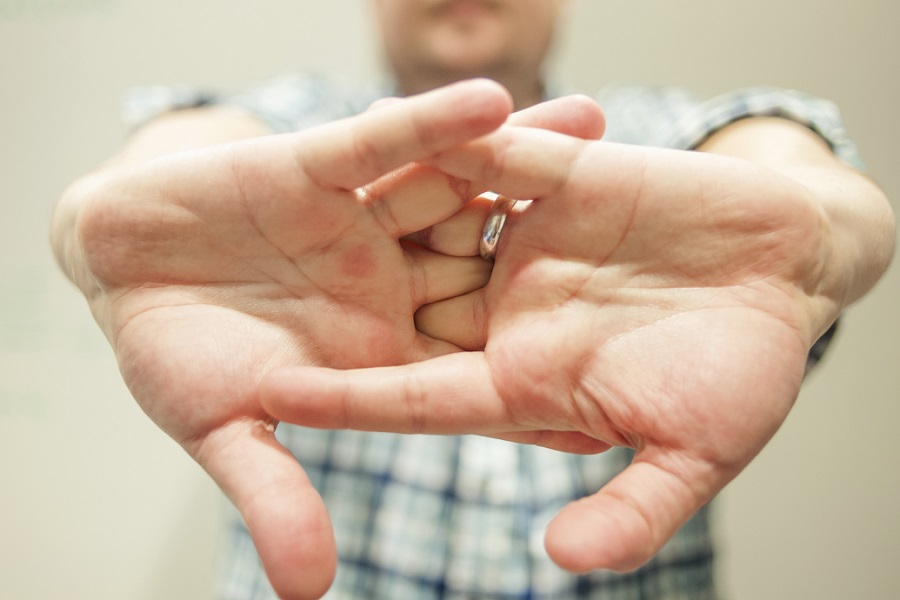
Published :
Updated :

We are all familiar with the loud popping noise when the fingers are pulled, squeezed or twisted. It has a fancy name, too, knuckle cracking.
Some of us are habitual knuckle crackers, while others are annoyed, bystanders. It is a common thing done by many with the excuse that it helps to alleviate their stress. Does it work? For them, probably.
But why the popping sound? There is nitrogen gas in our joint spaces. When we do the cracking, this creates gas bubbles. The bubbles get compressed as we pull the fingers, producing the characteristic pop.
Whether you just wince at the sound or do it yourself, you're likely familiar with knuckle cracking. Press, twist, squeeze, or pull on your fingers, and you get that satisfying crack sound.
Cracking your knuckles releases gas — in the form of nitrogen bubbles — from the space around your joints. The sound is triggered as the bubbles are compressed.
Knuckle cracking is a common behaviour enjoyed by many. It can become a habit or a way to deal with nervous energy; some describe it as a way to 'release tension.' For some, it's simply an annoying thing that other people do.
Is it bad or good? Let us look at the evidence. There has been a long-standing argument that knuckle cracking can make your joints prone to arthritis. But that really does not hold up to scientific study.
A California physician Dr Daniel Unger did a very interesting study on that. He used himself as the subject and cracked his knuckles twice daily for fifty years in his left hand.
He compared the result with his right hand and concluded that there were no differences in terms of arthritis symptoms. This was supported by a group of researchers from the University of Southern California School of Medicine. They conducted a survey among the elderly habituated to knuckle cracking. The results again did not reveal any link with joint degeneration or arthritis.
There is, however, one paper published by scientists of Mount Carmel Mercy Hospital, US. While they did not find any relation between knuckle cracking and arthritis, they did argue that knuckle cracking could lead to impaired hand functions in the form of reduced grip strength and increased risk of joint swelling.
They also associated habitual cracking with frequent nail biting, smoking and alcoholism. Their study was published 33 years ago, and over time, much of their argument was proven wrong.
A newer study 2017 by Mustafa Kemal University Medical School in Turkey proved that grip strength is not affected in knuckle crackers.
There was a long-standing debate if cracking fingers over many years can increase the risk of osteoarthritis.
Uniformed Services University of the Health Sciences, US researchers reviewed this claim. According to them, it does not matter how frequently or how long you are cracking your knuckles. There is little risk of any bad effect on your joint.
Michael Behr, an orthopaedic surgeon at Piedmont Hospital, concluded that current studies do not show that knuckle cracking is related to any adverse medical condition.
It must be remembered that if the fingers are twisted or pulled with excess force than is necessary, this could lead to danger.
There are some medical reports about joints being dislocated or tendons injured due to knuckle cracking with excessive force. Also, if there is pain or swelling around the cracked fingers, it is advisable to see a physician.
So if we want to crack our knuckles, we can go do that with peace of mind because it is unlikely to cause injury. Getting rid of this habit might be better, but this is the most effective way to relieve stress for some people. And we really do not have a specific medical reason for them not to do it, except for the fact that it is sometimes very annoying!
Just a note at the end. If you have cracked your knuckle while reading this article, do not try to do it for the next half an hour. The gas bubbles required for the pop needs will need that time to dissolve in the joint fluid. Then you are ready to do it again. So, be patient!
imtiazdmc@gmail.com


 For all latest news, follow The Financial Express Google News channel.
For all latest news, follow The Financial Express Google News channel.